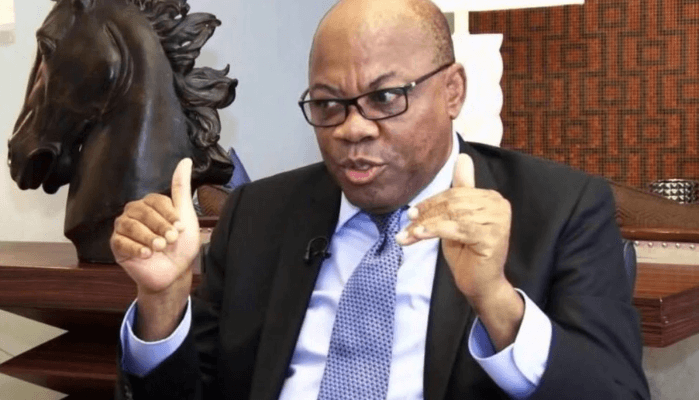Anti-corruption activists have supported the position of a former president of the Nigerian Bar Association (NBA) Dr Olisa Agbakoba (SAN) against what they described as the politicisation of the Economic and Financial Crimes Commission (EFCC).
They said the anti-graft agency’s recent actions, especially against the Kogi State government, portray it as a “compromised political tool”.
The activists are Debo Adeniran, the executive chairman of the Centre for Anti-Corruption and Open Leadership (CACOL); Chief Abiodun Sowunmi of On-Air Personality/executive director, Africa Labour Research Centre; Comrade Mark Adebayo, chairman, Secureworld and Liberty Initiative for Peace and co-national spokesperson of the Coalition of United Political Parties (SUPP); Comrade Olufemi Lawson, executive cirector, Centre For Public Accountability; Barr. Emeka Igwe, a legal practitioner; Comrade Toyin Raheem, chairman, Coalition Against Corruption and Bad Governance (CACOBAG); Comrade Akinbiyi Omoleye, secretary, Zero Corruption Movement (ZECOM) and Comrade Ishola Adeshina, Kill Corruption Coalition.
They called on President Muhammadu Buhari to call the EFCC to order and move to save the image of the government as regards its commitment to an unbiased war against corruption.
Singling out what they described as an unending persecution of the Kogi State government, the activists said the EFCC’s job was not tidy as it had given a loud impression that there was a political axe to grind with the State beyond the mandate of the Commission.
In a statement, jointly signed by them and titled: “EFCC Must Stop Acting Like a Compromised Political Tool”, the activists insisted that there were numerous instances where the Commission had shown itself to be outrageously selective in its investigations, arrests and prosecutions.
They said, “We unequivocally stand with Dr. Olisa Agbakoba, SAN, in his observations and call on the EFCC to review its operational methods in a way that will not compromise its founding principle.
“It must eschew every manner of political patronage and manipulation, which are bound to destroy its public perception locally and internationally. The Kogi issue that Dr. Agbakoba, SAN, alluded to is one case too many. There is a strong suspicion that EFCC has a particular interest to cause chaos in Kogi State by its unnecessary and reprehensible fixation on the state and its affairs.”
“We call on the EFCC to shed its political toga and concentrate on its constitutional mandate of fighting corruption and leave politics to politicians. We call on President Muhammadu Buhari to call the EFCC to order before it destroys the impressive achievements of President Muhammadu Buhari in the area of fighting corruption, which is acknowledged as unprecedented even by his most vehement critics,” they noted.
Meanwhile, the EFCC has accused Agbokoba of goofing in casting aspersions on the commission’s commitment to rule of law and its investigation of the finances of the state government.
The EFCC said the commission takes great exception to the “indecorous and utterly irresponsible attempt by Agbakoba to dress it in the borrowed garb of a lawless entity and a meddlesome interloper, who has no business probing the stealing of Kogi State resources.”
EFCC spokesperson, Wilson Uwujaren said, “In all his tirades, no evidence was presented to support his claim that the EFCC had been lawless, nor did he mention any law which the commission’s investigation of the finances of the Kogi State government violated.
“Instead, his refrain was to a non-extent decision of the Supreme Court which he also failed to elaborate upon. But it is important to state that contrary to the views of Agbakoba, the Supreme Court at no time delivered any judgement which forbids the EFCC from investigating fraud cases involving a state government.
“The learned counsel ought to have known that the apex court of the land as far back as 2010 in Jolly Tevoru Nyame V FRN (2010) 11 NWLR (PT.1193)344 held that the “claim that the money belongs to Taraba State and that the state has exclusive claim on it to the exclusion of any other authority by virtue of section 120 of the 1999 constitution cannot stand.’
“Furthermore, Agbakoba’s erroneous views ought to be tempered by the decision of the Supreme Court in AG Ondo State vs AG, Federation (2002) 9 NWLR [pt.772] page 222 at page 308 where the court held: ‘It has been pointed out that the provisions of the Act impinge on the cardinal principle of federalism, namely, the requirement of equality and autonomy of the State Government and non-interference with the functions of state government. This is true, but as seen above, both the Federal and State Government share the power to legislate in order to abolish corruption and abuse of office. If this is a breach of the principle of federalism, then, I am afraid, it is the Constitution that makes the provisions that have facilitated the breach of the principle. As far as the aberration is supported by the provision of the Constitution, I think it cannot rightly be argued that an illegality has occurred by the failure of the Constitution to adhere to the cardinal principles which are at best ideals to follow or guidance for an ideal situation.”





